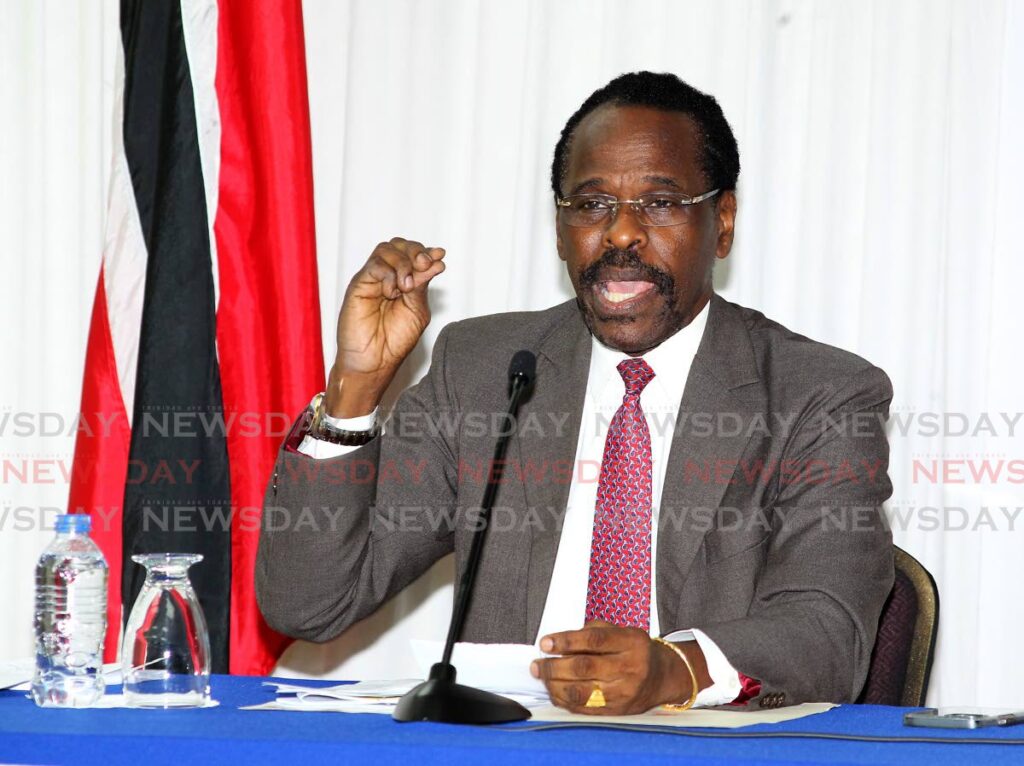Judge accuses Fitzgerald Hinds of interference in death row visit

A HIGH COURT judge has condemned what he said appeared to be an an attempt by a member of the Executive to “interfere with judicial independence” and the court’s exercise of its discretion and authority.
The judge was referring to a letter sent by acting Commissioner of Prisons Deopersad Ramoutar to the Registrar of the Supreme Court on the advice of the Minister of National Security, Fitzgerald Hinds, asking for clarity on a visit to the Port of Spain prison as part of a constitutional claim brought by a former death row inmate.
At a virtual hearing on Thursday, Justice Frank Seepersad condemned the contents of the letter which he read out.
“If the contents of the letter are accurate and same was issued pursuant to the directions of a member of the Executive, such a circumstance signals that there may be an impending constitutional crisis and/or an overt attempt by a member of the Executive to interfere with judicial independence and the exercise of judicial discretion and authority,” the judge said.
“It is unfathomable that any politician or member of Executive would have the temerity to challenge the efficacy of an order issued by the court, in an unresolved constitutional claim, where the Attorney General is the substantive respondent.
“This attempt at interference must be condemned and will not be condoned,” Seepersad said. Neither the judge nor the prisons commissioner named Hinds just his title, in the matter.
Seepersad described the commissioner’s letter to the court as “an unwelcomed, unprecedented and unacceptable development.”
In the letter, Ramoutar said he was advised by the minister to seek “clarity” of the judge’s request to visit the prison. Ramoutar asked why the court, having previously ruled in favour of removing murder convict Ronald Bisnath from death row, found it “purposeful anymore for an on-site visitation (to the prison) by the court.”
Seepersad said the commissioner’s letter alarmed him.
He highlighted the importance of judicial independence and separation of powers, saying, “this court will fearlessly defend those principles as well as the integrity and impartiality of this office.”
Seepersad said the letter was premised on an evident lack of appreciation of the claim before him.
“Although the nature of the case and the relief sought in the instant matter should be obvious, for the elucidation and edification of the Minister of National Security and the acting Commissioner of Prisons, the substantive issue as to whether the claimant is entitled to damages for breach of constitutional rights has not been resolved.”
He said in the exercise of its judicial discretion and without objection from the Attorney General’s attorneys, the court felt it necessary to visit the prison to ascertain the current conditions on death row and the area where Bisnath was now being kept to assist with the quantification of damages if it reached that stage.
Seepersad reminded all the parties that a judge is an “ex-officio official visitor” to the prison who can visit at any time and for any reason.

“The Minister of National Security and/or the Commissioner of Prisons must also be reminded that they do not exercise any appellate jurisdiction over judges and the enquiry as to whether the site visit is 'purposeful’ is not only inappropriate but it disregards defined constitutional boundaries and displays a disturbing lack of appreciation as to the limits of their jurisdictional remit.
“It must not be forgotten that the scales of justice must be evenly balanced and judges, as the guardians of the Constitution, must freely and fairly interpret and apply the law as they steadfastly protect the constitutional rights of all citizens, from the common man, the CEO, to the convict.”
He admitted that the apparent hesitance for him to view the current prison conditions had heightened his curiosity and since the last prison visit by a judge was done in 2007, by Justice Carol Gobin who described conditions there as “alarming,” he wanted to see, 16 years later, what it was like now.
“This court is therefore resolute in its view that it must see for itself the current scenario which exists behind the prison walls.”
Seepersad adjourned the hearing to go to the prison after which he returned to court where he gave the lawyers an opportunity to work out the directions for the filing of submissions. He will then set a date for his decision. Last month, Seepersad, in ordering Bisnath’s removal from death row, also ordered that the sentence of death imposed on him on March 27, 2014, be vacated.
He also granted the declarations Bisnath sought that any attempt to carry out the death sentence would constitute a contravention of his rights and his continued detention in the condemned cells would also be a breach.
Bisnath, of Crown Trace, Enterprise, was sentenced to hang in 2014 for the murder of 13-year-old Parmanand "Boyo" Persad, whose body was discovered in a partially-built Chaguanas house in 2006.
Persad, a student of the Chaguanas Junior Secondary School, was murdered on October 29, 2006. His body was found in the bathroom of a house at Crown Trace, Enterprise. Police said he had been beaten and his throat slit, and he had possibly been sexually assaulted. At the time, they described it as one of the more gruesome murders they had come across.
Bisnath was found hiding in some bushes close to where Persad’s body was found.
In his application for his removal from death row, Bisnath’s attorneys Gerald Ramdeen, Wayne Sturge and Dayadai Harripaul submitted that their client was being incarcerated on death row in excess of the five-year limit set out in the Jamaican death-penalty case of Pratt and Morgan.
They argued he remained under the sentence of death, which cannot now be lawfully carried out, and his continued detention in a condemned cell is unconstitutional.


Comments
"Judge accuses Fitzgerald Hinds of interference in death row visit"